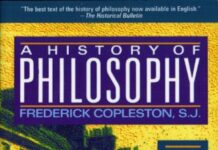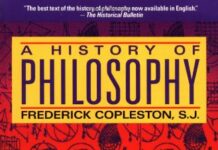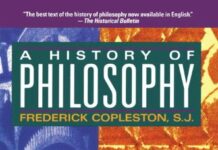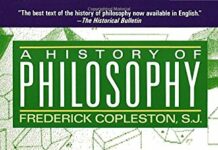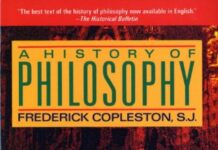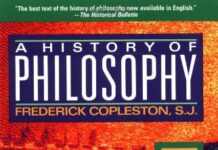
Ebook Info
- Published: 1993
- Number of pages: 496 pages
- Format: PDF
- File Size: 7.66 MB
- Authors: Frederick Copleston
Description
Conceived originally as a serious presentation of the development of philosophy for Catholic seminary students, Frederick Copleston’s nine-volume A History Of Philosophy has journeyed far beyond the modest purpose of its author to universal acclaim as the best history of philosophy in English.Copleston, an Oxford Jesuit of immense erudition who once tangled with A. J. Ayer in a fabled debate about the existence of God and the possibility of metaphysics, knew that seminary students were fed a woefully inadequate diet of theses and proofs, and that their familiarity with most of history’s great thinkers was reduced to simplistic caricatures. Copleston set out to redress the wrong by writing a complete history of Western philosophy, one crackling with incident and intellectual excitement — and one that gives full place to each thinker, presenting his thought in a beautifully rounded manner and showing his links to those who went before and to those who came after him. The result of Copleston’s prodigious labors is a history of philosophy that is unlikely ever to be surpassed. Thought magazine summed up the general agreement among scholars and students alike when it reviewed Copleston’s A History of Philosophy as “broad-minded and objective, comprehensive and scholarly, unified and well proportioned… We cannot recommend [it] too highly.”
User’s Reviews
Editorial Reviews: From the Publisher Conceived originally as a serious presentation of the development of philosophy for Catholic seminary students, Frederick Copleston’s nine-volume A History Of Philosophy has journeyed far beyond the modest purpose of its author to universal acclaim as the best history of philosophy in English. From the Inside Flap Conceived originally as a serious presentation of the development of philosophy for Catholic seminary students, Frederick Copleston’s nine-volume “A History Of Philosophy has journeyed far beyond the modest purpose of its author to universal acclaim as the best history of philosophy in English. About the Author Frederick Copleston (1907-1994) grew up in England. He was raised in an Anglican home but converted to Catholicism while a student at Marlborough College. He later became a Jesuit and then pursued a career in academia. He studied and lectured at Heythrop College and wrote an eleven-volume History of Philosophy, which is highly respected. He also spent time teaching at Gregorian University in Rome and, after he retired, lectured at Santa Clara University in California. He was appointed a member of the British Academy in 1970. He is famous for debating Betrand Russell over the existence of God in a 1948 BBC broadcast. Read more
Reviews from Amazon users which were colected at the time this book was published on the website:
⭐Excellent
⭐Erudition is now completely gone. Thank you Frederick for putting these together.
⭐Great history of philosophy.
⭐good book
⭐The author gives a good overview of the philosophy leading up to the Renaissance in Europe.
⭐Order arrived as described. 5 stars
⭐love it.
⭐This third volume of Copleston’s History is the last one concerning philosophy before the “modern” era. It is addressing philosophical reasoning toward the end of the European Middle Ages (the “age of faith”) and the rise of modern thinking, especially scientific thinking, in the Renaissance. Basically, it begins with the thought of the fourteenth century, especially with Ockham, when the accommodation of Aristotle’s ideas in religion, especially with Aquinas, started to be the object of criticism. Aristotelian philosophy, despite its egregious defects, had a profound influence, because it opened European eyes to a systematic work on many important facets of “pagan” thinking, and connected European Christian theology with the thinking of Jewish and Islamic philosophers who were influenced by Aristotle’s work. Especially significant was Aristotelian concerns with the world of sensory experience. The Christian faith had led to a focus on the supernatural and on understanding and justifying religious beliefs. The world of Europe shifted under the impact of Aristotle toward the material world, science and technology. Although, of course, at this time Medieval thinking and Christianity still exercised profound influence. Copleston’s final parts of this history are, in fact, focused on one of the profound Christian thinkers of the Renaissance, namely Francis Suarez. This is certainly an indicator that Medieval thinking was not out of touch with the significant ideas propelled forward in the Renaissance. We see philosophy and theology separating at this time, and the world was evolving toward a new orientation, represented by people such as Descartes, Locke, and Leibniz. Because our contemporary world, dominated to an extreme degree in the popular culture by science and technology, is totally oriented toward materialism and the enormous impact of materialist thinking, shutting out, to a large extent, the supernatural considerations of Christian theology, we have to ask ourselves whether or not the philosophy of the late Middle Ages and the Renaissance is even cogent for people who want a good perspective on philosophy. To a certain extent, there is a significant tendency to skip from the ancient Greek philosophers, especially Plato and Aristotle, into the modern age, and just omit the developments in the Medieval period. On the other hand, scholarship has demonstrated that there was not simply a discontinuity between the modern age and Medieval thinking. Copleston tries to dispel the idea that the Medieval thinkers, caught up as many were, in a world extremely different from our contemporary one, are not worth consideration. Certainly there is an alien feel about Medieval and Renaissance philosophy. I think, however, that for people who are significantly interested in modern philosophy, the evolution during the Medieval and Renaissance times gives us an important piece of the puzzle of modern philosophy. The Medieval philosophers were not merely slavish adherents to the literal words of Aristotle, but significantly added to Western philosophy. I recommend this book to people who have some background in philosophy and want a better perspective. It is at an introductory level, but also a very scholarly piece of work, and Copleston’s ideas and commentary are worthwhile to consider. It is a very serious, clear piece of work that can be helpful for those unfamiliar with this phase in the history of philosophy and the author makes an effort to demonstrate the importance of the philosophical thinking of this time. He strives to show that the religious complexion of this time is not inimical to science and technology.
⭐Fr Frederick Copleston SJ gives a very fair insight into the philosophy of the 14th to 16th centuries like no other. His writings and knowledge on the philosophers and thinkers of this time whom are obscure to most of us is fascinating. It is right to say that this volume includes the thinkers who have paved the way to modernity (Descartes, Hobbes, Hume), yet who are greatly if not entirely, neglected in intellectual circles.It is certainly necessary to understand the context which brought about the systems of modern thought as we know it and what this volume does best is to demonstrate that rather than being a revolution out of the blue, it was preceded by two major thinkers whom were already heterodox in their thought compared to the other Scholastics of previous centuries. These two thinkers were William of Ockham and Francisco Suarez. Ockham famously known for his “Ockham’s Razor” and for invoking the “Crucified donkey” hypothesis, was the founder of modern-day theological arbitrariness. Suarez was another thinker who departed in many ways from the teachings of St Thomas Aquinas, especially in the realm of metaphysics with regard to the distinctions of act/potency in substances and on the nature of the 4 causes. It is important to realise that the Cartesian revolution was greatly influenced by Suarez and not by the traditional teachings of St Thomas Aquinas, as commonly thought. This volume indeed helps us know the kind of thought that was being introduced to Descartes as a young student at La Fleche by the Jesuits.As a Thomist, Fr Copleston also gives insight not only to the two main figures surrounding that era (Ockham and Suarez) but also the great Thomistic commentators such as Cardinal Cajetan and John of St Thomas, although the latter could have had more said of in this volume. But he also does a great work in showing us of the enormous disputes and controversies between the Jesuits, especially Molina, and Dominicans, especially Bañez with surrounding the realm of natural theology and metaphysics.I read this volume primarily as a continuation from volume 2 and a prelude to volume 4, where we are marked by the rise of the modern thinkers whom have shaped most of contemporary thought. This volume is of utmost importance for someone who wishes to have a good historical and intellectual formation on the transition of scholastic philosophy to modern dialectical thought and I would greatly recommend to anyone who wishes to learn modern philosophy, that they learn truly the foundations of it through this particular volume.
⭐Classic philosophy. Great service!
⭐Si tratta di una vecchia edizione di un testo ancora validissimo di una storia della filosofia occidentale in inglese. Davvero completo e semplice da capire. Lo userò per le mie lezioni CLIL di filosofia.Very pleased with this book.
Keywords
Free Download A History of Philosophy, Volume 3: Late Medieval and Renaissance Philosophy: Ockham, Francis Bacon, and the Beginning of the Modern World in PDF format
A History of Philosophy, Volume 3: Late Medieval and Renaissance Philosophy: Ockham, Francis Bacon, and the Beginning of the Modern World PDF Free Download
Download A History of Philosophy, Volume 3: Late Medieval and Renaissance Philosophy: Ockham, Francis Bacon, and the Beginning of the Modern World 1993 PDF Free
A History of Philosophy, Volume 3: Late Medieval and Renaissance Philosophy: Ockham, Francis Bacon, and the Beginning of the Modern World 1993 PDF Free Download
Download A History of Philosophy, Volume 3: Late Medieval and Renaissance Philosophy: Ockham, Francis Bacon, and the Beginning of the Modern World PDF
Free Download Ebook A History of Philosophy, Volume 3: Late Medieval and Renaissance Philosophy: Ockham, Francis Bacon, and the Beginning of the Modern World
